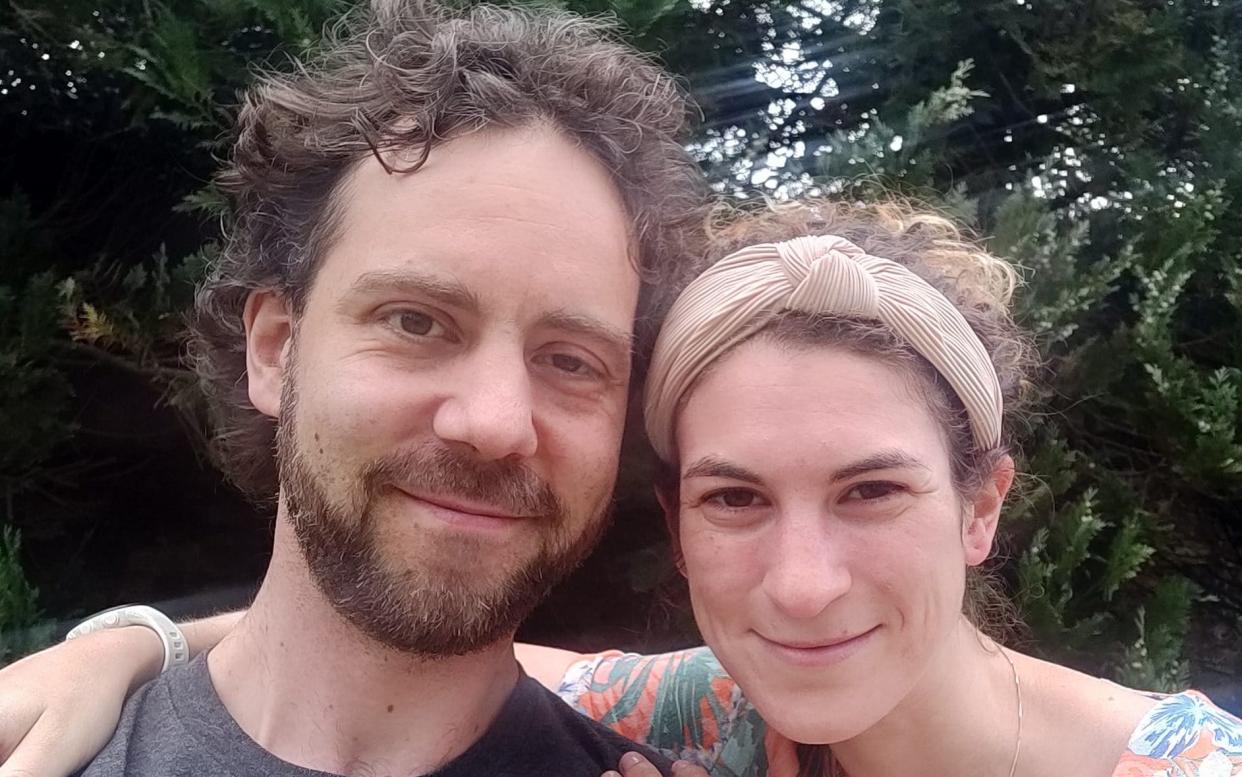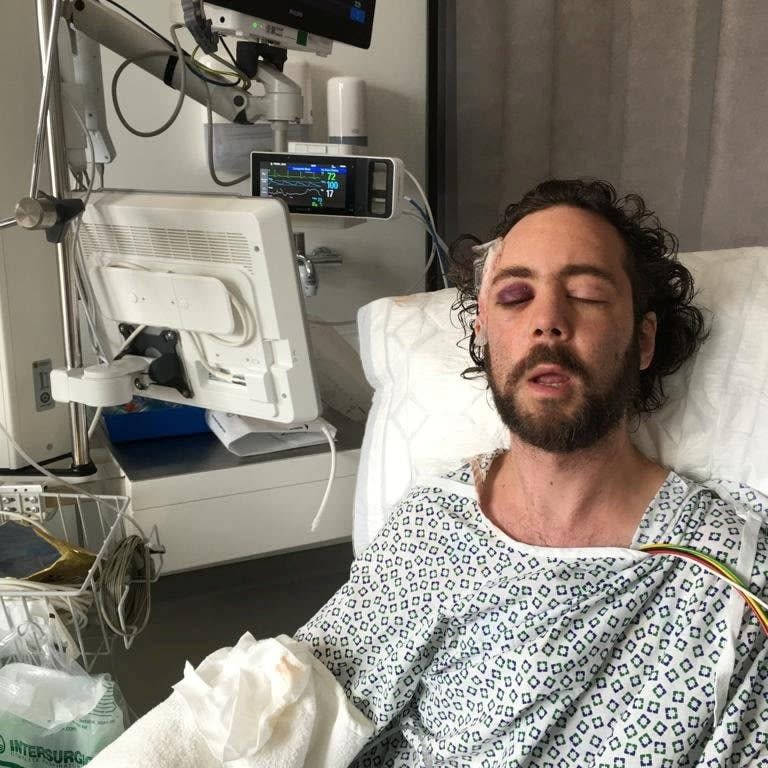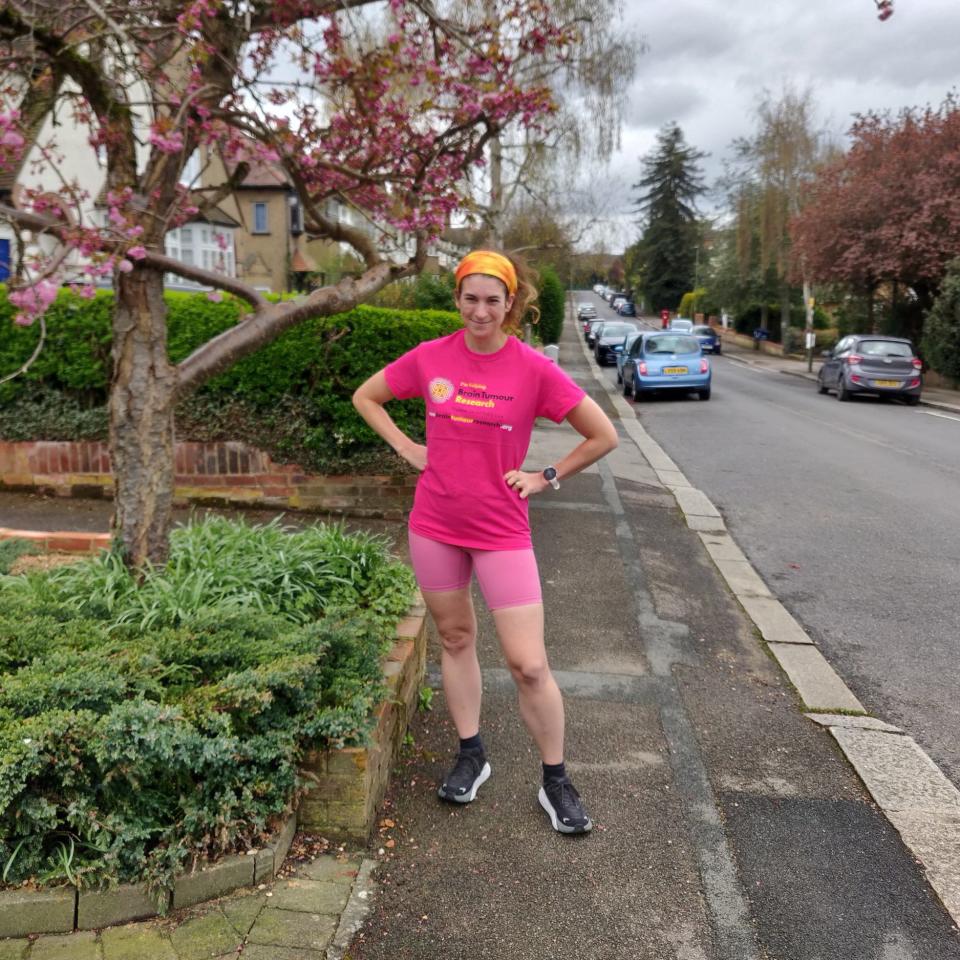‘I loved my fiancé, but after his brain cancer diagnosis I knew I had to leave him’

On September 8 2022, the day the Queen died, my life changed forever. This is because it was also the day I found out that my partner of two years, Jelle (pronounced ‘Yella’) Fresen, at the age of 37, had stage four brain cancer.
“I’m really sorry,” said the neurologist, “but your scan suggests a malignant stage-four brain cancer called medulloblastoma.” As soon as I heard these words delivered to my fiancé, I knew the future we had planned out was over. It had disappeared in a matter of seconds.
Two years earlier, our life together had seemed so promising. I knew he was the one as soon as I met him. I had broken up with my ex-boyfriend a few months previously and was ready to meet someone new. So I signed up to the dating app Bumble, and that was how I found Jelle. A Dutch software engineer working for Google in London, he was kind, quirky and funny. I was a school physics teacher, so we were both quite nerdy, science types, and I loved how active he was, always going running or climbing in his spare time.
We were both so sure the relationship was right, we told each other during our second date: “This is it.” We had got together during the pandemic, in summer 2020, me aged 30, him 34, and when the second lockdown was announced I asked him to move in. Although it was still early in our relationship, it didn’t feel too soon.
Living together in High Barnet, north London, we grew even closer, quicker than we might have done otherwise. Both of us were working from home, isolated from others, and spending all our time together. I always think that a great way of telling if you have a good relationship is if you feel like you’re a better person when you’re with your partner. I felt that with Jelle. He challenged me to be kinder, more aware of what is going on in the world, more curious. I was so happy and felt so lucky to have met this amazing man.

We didn’t know at that point the cruel twist that lay in wait for us, the cancer that had been growing in Jelle’s brain throughout our relationship. It wasn’t until the day after Jelle’s 37th birthday that symptoms appeared. He had woken up feeling dizzy and nauseous. At first we assumed it was just a hangover following our celebrations. But the symptoms never went away; instead they grew worse.
Within about a month he was vomiting all the time. We had planned a few trips abroad but had to cancel because Jelle felt too unwell. Initially, doctors thought it was vertigo and told him he would get better, he just had to wait. But he continued to feel so sick he couldn’t work.
A GP carried out the standard checks to see if it could be brain-related, but Jelle showed no signs of problems with his balance or cognition. Eventually he was referred to an ear, nose and throat (ENT) doctor, who thought he was suffering from the after-effects of a bad ear infection and referred him for physio to improve his damaged vestibular system.
But the vomiting grew worse and worse, to the point where it was triggered by any movement at all. Even the act of getting out of bed would send Jelle rushing to the bathroom to throw up. So he returned to the ENT clinic, where an MRI scan was carried out. Later that day, the doctor called him and told him they had found a mass on his brain: a tumour.
It was thought to be benign at first, and when Jelle told me the news we both cried tears of shock but also of relief. I naively believed the doctors had finally found the cause of his problems and that everything would be okay as soon as the tumour was removed. I clung to this thought for dear life.
We had planned to get engaged and I knew Jelle was going to propose in the summer when we were on holiday. But we had to cancel the holiday, so I thought: “I’m going to propose to him instead. This isn’t going to get in the way of our future.”

Just a few weeks after our engagement we received the really devastating news that more detailed scans had shown Jelle’s tumour wasn’t, in fact, benign: it was a rare type of cancer of the central nervous system called medulloblastoma, more often seen in children than adults. Jelle was told the chance of him getting it had been one in four million. His chance of surviving five years was 65 per cent.
Both of us broke down in tears. But while I went to pieces and remained a mess for a long time afterwards, Jelle was remarkably strong and calm. He never once said, “Why me?” or “It’s not fair.” His attitude was: “These are the cards I’ve been dealt and I just have to get on with it.”
But I knew then I could not stay with him. Watching helplessly as he got sicker and sicker over the preceding three months had been bad enough, but the uncertainty the diagnosis brought was just too much for me. I spent many sleepless nights researching, trying to find a miracle cure or a story with a good outcome but all I could find was uncertainty and bleak statistics. Not only was there a significant chance of the cancer returning in the future but there was the possibility of long-term and sometimes delayed side-effects from the radiotherapy and chemotherapy treatment on his brain.
I felt like the man I loved was slipping away from me. I had been so close to having everything I wanted and then, all of a sudden, it had been snatched away. I couldn’t eat or sleep, I was suffering from panic attacks and taking all kinds of medication to help me function, to little effect. I told my mother and his: “I can’t do this, I can’t stay with him.”
They warned me not to tell him my decision at least until after his surgery. So I went to stay at my mother’s and in late September Jelle went into hospital for a 17-hour operation to remove the tumour. At 4am I finally received a call from the surgeon: Jelle was out of the operating theatre and was talking and moving his arms and legs. But he’d also been left with some quite severe brain damage, and had to get used to living with disabilities. He had double vision and paralysis on the right side of his face.
He also had motor skills issues and had to learn how to write and walk again. Despite all this, he has coped amazingly well. Me, less so.

We had had a brief conversation about our future before his surgery and I’d admitted I was struggling. “But there is a chance it can be cured,” he protested. I ended our relationship about two weeks later. He was still recovering in hospital and I sat and faced him on a chair and told him I couldn’t stay with him. “I can’t see a way I can be happy with you any more,” I said, devastated. I knew I would be no good for him because I couldn’t even function myself, due to the uncertainty of it all and the thought of him suffering more in the future. He needed strength and optimism and I could not provide that. We shed tears, then, for the future we wouldn’t have.
I’m still trying to come to terms with my decision. At the time, I felt like the worst person in the world, and I know if I heard this story about someone else I would think they were selfish. That is partly why I wanted to write this article, because it’s very easy for society to make judgments, but in situations like this there aren’t clear-cut right and wrongs. Sometimes we need to remember we can’t judge someone when we are not in their shoes. Jelle understood, as did my friends and family, and he and I remain close friends.


On Sunday, I will run the London Marathon in his honour. He has run several marathons himself, whereas I have never done more than a 5K, so it will be tough going. But I’m doing it for him, and for Brain Tumour Research. Treatments for brain cancer have barely changed in the last 30 years and there is a concerning lack of funding from the Government into brain-cancer research. We really need to find more effective treatments with fewer side effects so that, in the future, others in Jelle’s situation will not need to go through all he has.
To donate to Danielle’s JustGiving page and help her meet her £10,000 target, visit here

